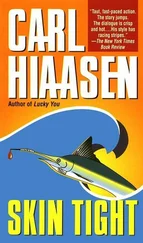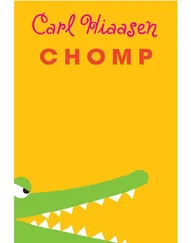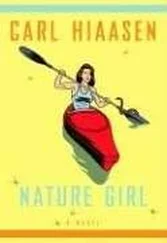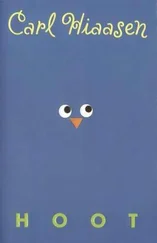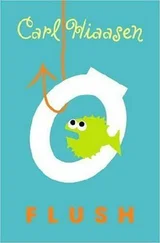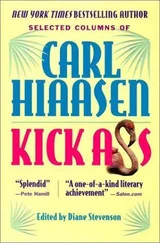Carl Hiaasen - A Death in China
Здесь есть возможность читать онлайн «Carl Hiaasen - A Death in China» весь текст электронной книги совершенно бесплатно (целиком полную версию без сокращений). В некоторых случаях можно слушать аудио, скачать через торрент в формате fb2 и присутствует краткое содержание. Жанр: Детектив, на английском языке. Описание произведения, (предисловие) а так же отзывы посетителей доступны на портале библиотеки ЛибКат.
- Название:A Death in China
- Автор:
- Жанр:
- Год:неизвестен
- ISBN:нет данных
- Рейтинг книги:3 / 5. Голосов: 1
-
Избранное:Добавить в избранное
- Отзывы:
-
Ваша оценка:
- 60
- 1
- 2
- 3
- 4
- 5
A Death in China: краткое содержание, описание и аннотация
Предлагаем к чтению аннотацию, описание, краткое содержание или предисловие (зависит от того, что написал сам автор книги «A Death in China»). Если вы не нашли необходимую информацию о книге — напишите в комментариях, мы постараемся отыскать её.
A Death in China — читать онлайн бесплатно полную книгу (весь текст) целиком
Ниже представлен текст книги, разбитый по страницам. Система сохранения места последней прочитанной страницы, позволяет с удобством читать онлайн бесплатно книгу «A Death in China», без необходимости каждый раз заново искать на чём Вы остановились. Поставьте закладку, и сможете в любой момент перейти на страницу, на которой закончили чтение.
Интервал:
Закладка:
"That is a factory belonging to the commune. They make Tiger Brand sewing machines." Mr. Xia smiled. "The factory wants to expand, but the local authorities will not allow it because it is not known what is buried around the factory, or even under it. The factory owners say they do not care about old things: It is the commune's land and the commune has an obligation to provide a good life for its people."
"Sounds like the kind of squabble we have at home between environmentalists and developers," Stratton said. "What happened?"
"The dispute went all the way to Peking. There is no decision yet," said Mr.
Xia.
Stratton turned to Kangmei. "By 'Peking' does he mean your father?"
She nodded.
To honor a cruel emperor reviled for two thousand years, but latterly proclaimed a hero, the Chinese had created an instant museum.
Kangmei vanished in search of young co-conspirators. Mr. Xia led Stratton into a large building with a vaulted roof that looked like an airplane hangar. Once inside, the guide went off to look for an official with whom Stratton could drink tea. Alone, Stratton pushed through two polished doors and into the main chamber.
It was like changing centuries.
Stratton stood about fifteen feet above the dig in a skylight-lit hall the size of a football field. His first thought was that it was the cleverest and most awesome museum he had ever seen. To protect the excavation while simultaneously exploiting the discovery as a tourist attraction, the Chinese had simply erected the museum over the dig.
Below Stratton, in roofless chambers that extended in four files, lay the Emperor Qin's celestial army. Stratton stood on a concrete platform, which was shaped like a square U with two wings stretched out parallel along the files. In the pit, a modern army of Chinese technicians worked with brushes, dust pans and hand shovels. Stratton stared into the chamber where three hundred clay soldiers stood.
They were magnificent. He had seen pictures, of course-who had not?-but even that foretaste had left Stratton unprepared for their true majesty.
The figures were life-sized, nearly six feet tall. They had been molded from gray river clay by master craftsmen, dead for twenty-two hundred years. Stratton stared with breathless fascination at the nearest warrior, a kneeling archer.
The detail was extraordinary.
The archer wore a topknot, pulled tightly to the left side of his head and held with a band. Stratton could count the hairs.
The archer's ears clung close to his skull. The eyebrows were high and stylized, as though they had been plucked. The nose was broad, classically Chinese. The warrior had affected a finely combed mustache and a tuft of hair on his chin. On the face, mirthless and resolute, were flecks of blue and red paint mixed two centuries before Christ was born.
The archer wore a studded jerkin that reached below his waist and ended high on the biceps. It afforded protection from sword slashes, while at the same time allowing mobility with which to wield a bow. Below the waist, the emperor's soldier wore a skirtlike loincloth, leggings and stout, square-toed sandals.
Nearby, a second archer wore the same uniform, but his face was different-rounder, a trifle older, no mustache. Every soldier, Stratton noted with awe, had a different face-in eternity, as in life.
Stratton paced the arms of the platform. Here lay a terracotta arm jutting out from the red clay. And there, a headless torso, being dusted by a young woman with intense concentration. Toward the back of the vast hall, new chambers had been carefully outlined in chalk, but had so far been unmolested. Working at their current painstaking pace, Stratton reckoned, it would take the Chinese technicians at least another ten or twenty years to exploit the dig completely.
Stratton was fascinated. He could have stayed for hours. Too soon, Mr. Xia was at his side.
"Director Ku will see you for a few moments, but you must hurry. It is nearly closing time."
Reluctantly, Stratton followed him out of the chamber.
"Mr. Xia, do you realize that this might be the most important archaeological discovery of this century?" Stratton asked.
"Yes, so many American friends have told us. The soldiers excite them very much, but there are many other discoveries as well."
"Can I see them?"
"I am sorry, but only the soldiers are open to the public."
Director Ku was a roly-poly individual with a ready smile and the callused hands of a worker. Stratton squatted on the inevitable overstuffed chair and tried not to drink the tea.
The pleasantries went quickly enough. Ku, Stratton suspected, was not a man to keep his dinner waiting. Even the set speech that seemed to come with every Chinese official's job seemed to sail by: the discovery had been made in 1965 by peasants digging a well. During the Cultural Revolution, not much happened.
Since then, the work had proceeded systematically, entirely in the hands of Chinese specialists; no foreigners were welcome. Test excavations were still being dug. So far, scientists had positively identified an armory, an imperial zoo, stables, other groups of warriors, the tombs of nobles sacrificed to mark the emperor's death, the underground entrance to the tumulus and exquisite bronze workings, including a chariot two-thirds life-size.
"I did not know about the bronzes," said Stratton. "Can they be seen?"
"They are in Peking," came back the translation. Stratton saw what he thought was a flash of annoyance on the director's lined face. Annoyance at the question? No, more likely at the thought that Xian's precious treasures had been preempted by the central government.
"Explain about my friend and his brother, Xiao-Xia, but this time don't ask if they were here. Say that my friend told me he would always remember the hospitality he received here."
At the translation, Ku's face lit. He reached into his breast pocket and extracted a silver ballpoint pen.
"The director says he remembers your friend very well. He calls him the 'gentle professor' and shows you the pen he was honored to receive as a gift," said Mr.
Xia.
Bingo. But now what?
"Ask the comrade director if it would be possible for me to see the special excavation that my friend and his brother visited. Be sure and use Kangmei's father's name."
That provoked a quick exchange in Mandarin before Mr. Xia finally said: "He asks if you have permission."
A direct hit. "Tell him yes."
Mr. Xia looked quizzically at Stratton.
"Do you really have permission?"
"Of course."
Stratton barely concealed his impatience at the Mandarin that followed. If he could see what David had seen, he might understand why the brothers had quarreled. Ku, who obviously took no pains to hide his own distaste for Peking, might even tell him. For him, Peking probably meant Wang Bin.
"The director regrets that the excavation is only opened when Peking advises him that an important visitor is coming. He regrets that the responsible officials in Peking did not inform him you were coming, but, he says, perhaps in a day or two it will be possible."
Damn. What that meant was that the director would check with Peking.
"I would be grateful," Stratton said. "Ask him if my friend-"
"The director also apologizes, but explains that he now must supervise the closing and meet with the technicians to discuss tomorrow's work schedule," Mr.
Xia interjected.
"Shit," said Stratton. It escaped. Mr. Xia looked perplexed. Stratton flushed.
"Say we are sorry for interrupting his work. Thank him for his hospitality and say we will return to look at the special excavation when the details have been arranged."
Darkness was falling and large numbers of workers had already left the site on a wheezy bus by the time Kangmei returned to the car.
Читать дальшеИнтервал:
Закладка:
Похожие книги на «A Death in China»
Представляем Вашему вниманию похожие книги на «A Death in China» списком для выбора. Мы отобрали схожую по названию и смыслу литературу в надежде предоставить читателям больше вариантов отыскать новые, интересные, ещё непрочитанные произведения.
Обсуждение, отзывы о книге «A Death in China» и просто собственные мнения читателей. Оставьте ваши комментарии, напишите, что Вы думаете о произведении, его смысле или главных героях. Укажите что конкретно понравилось, а что нет, и почему Вы так считаете.

